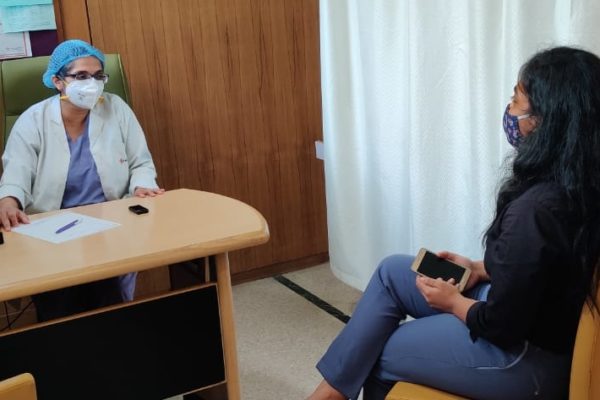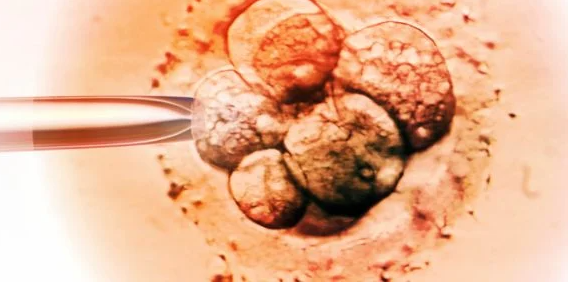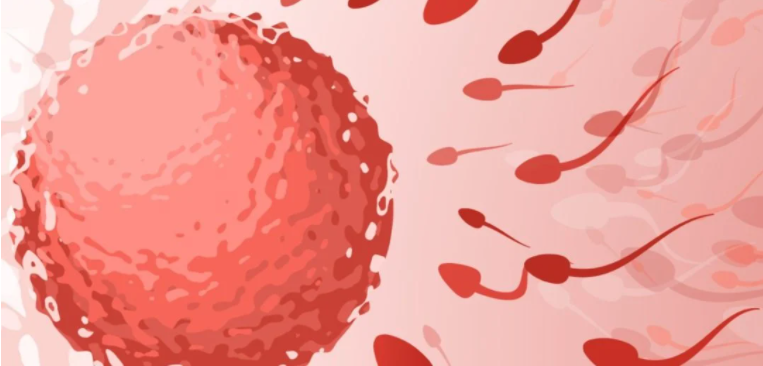Fertility Services
Home » Specialties » IVF Services
Overview
We understand how daunting it can be to keep trying for pregnancy. For couples considering assisted means of conception, it is natural to have many questions and concerns.
When you step into a consultation with our infertility and reproductive health expert, you can expect it to feel like a conversation with a friend, where you talk through the issues you’ve been facing, go over your medical records, and get answers from someone who understands your position. We have created an environment that ensures bonding between the couple and the gynecologist that helps eliminate anxiety.
Meet the Team





When would you need to consult a fertility expert?
Before venturing for an IVF, it is important to ascertain whether you even need it. Contrary to popular belief, many couples with ovulation problems, irregular cycles, sexual dysfunction may not always require IVF. They may be able to conceive naturally!
Absolute conditions when an IVF is generally required:
- Damaged or blocked fallopian tubes:
Any blockage or irreversible damage will hamper the sperm from reaching and fertilizing the egg.
- Poor sperm quality:
It can range from absent sperm to very low sperm count, motility or a combination of both may require this fertility treatment. An IVF might be the best treatment to overcome severe male infertility.
- Failed fertility treatment attempts:
Multiple failed attempts of fertility treatments like ovulation induction (OI), 3-6 cycles of Intra Uterine Insemination (IUIs) depending on age would indicate a need for an IVF procedure.
Relative conditions or few cases where an IVF may sometimes be required:
- Unsuitable hormonal environment
- Erratic ovulation
- Poor egg quality
- Increasing age of the partners
- Certain cases of endometriosis
- Combined male and female factors

What are the Andrology Services at Sitaram Bhartia?
Andrology as a specialization includes the management and treatment of male reproductive health and associated conditions.
Diagnosing male fertility problems usually involves:
- General physical examination and medical history: This includes examining your genitals and asking questions about any inherited conditions, chronic health problems, illnesses, injuries or surgeries that could affect fertility.
- Semen analysis: This is usually done to assess the sperm count, motility and function.
If your sperm analysis is normal, your doctor will likely recommend thorough testing of your female partner before conducting any more male infertility tests.
Your doctor might recommend additional tests to help identify the cause of your infertility.
These can include:
- Scrotal ultrasound:This test uses high-frequency sound waves to produce images inside your body. A scrotal ultrasound can help your doctor see if there is a varicocele or other problems in the testicles and supporting structures.
- Transrectal ultrasound:A small, lubricated wand is inserted into your rectum. It allows your doctor to check your prostate and look for blockages of the tubes that carry semen.
- Hormone testing: Hormones produced by the pituitary gland, hypothalamus and testicles play a key role in sexual development and sperm production. Abnormalities in other hormonal or organ systems might also contribute to infertility. A blood test measures the level of testosterone and other hormones.
- Post-ejaculation urinalysis: Sperm in your urine can indicate your sperm are traveling backward into the bladder instead of out your penis during ejaculation (retrograde ejaculation).
- Genetic tests: When sperm concentration is extremely low, there could be a genetic cause. A blood test can reveal whether there are subtle changes in the Y chromosome — signs of a genetic abnormality. Genetic testing such as Karyotyping or Y chromosome micro deletion might be ordered to diagnose various congenital or inherited syndromes.
- Testicular sperm extraction: The test involves removal of a small piece of testicular tissue, from which viable sperms are collected and used in processes such as ICSI or IVF. This test is usually done in cases of severe oligospermia (low sperm count).
- Specialized sperm function tests: A number of tests can be used to check how well your sperm survive after ejaculation, how well they can penetrate an egg, and whether there’s any problem attaching to the egg. These tests are conducted only if indicated.
- Microsurgical varicocelectomy if indicated: This is a procedure to remove swollen veins (varicoceles) in the scrotum, which may pose problems with fertility.
What Do We Do Differently?
- Personalized interactions: Through thorough medical evaluations of both partners and your condition, we try to understand where you are coming from, your socioeconomic conditions, thoughts and beliefs, availability of family support and more. The more we understand you, the better we will be able to assist you in your preconception journey.
- 56+ years of Combined Experience: Our specially trained team comprises a senior andrologist, fertility specialist and gynecologist, anesthetist, embryologist and nurse to guide you through every step of the way.
- Procedure Flexibility: We accommodate your schedules and try to minimize the stress involved by offering flexibility of injection timings, full privacy and one on one time to discuss anything important.
- End to End Services: Once you walk in through our doors, you will walk out with a smile. Our warm and compassionate team hold your hand and guide you through conception, antenatal care, labour and delivery, newborn and childcare and beyond. With the best in-house consultants, we cater to every need – fertility, obstetrics and gynecology, pediatrics, critical care – all with a promise of providing the care you can trust.
- Minimum interventions: Not every couple who has been unsuccessful at conceiving previously requires assisted reproductive techniques (ART) such as IUI/ IVF/ ICSI etc. Sometimes, a couple only needs careful counseling and the confidence to keep trying naturally.
- Compliance with National Standards: We use the most delicate and precise equipment and follow detailed processes for all ART procedures. We strive to excel and meet guidelines set by the ICMR and other organizations. We use only high quality cold chain maintained IVF stimulation drugs and individualize and optimise their use. All tests and ultrasound scans needed to monitor IVF cycles are done in house and reports are available within 2 hours.
- Serene Environment: The lush, green surroundings of the hospital along with helpful, caring staff reassure you that you’re in safe hands.
-
-
Services Offered by Our Team
Embryology Lab Services:
- Intrauterine Insemination (IUI) is another procedure, which is nearly as popular as IVF. The difference between IUI and IVF is that the sperm is injected into the woman’s womb at the time of ovulation, hence the term “insemination”.
- In Vitro Fertilization (IVF) is when the egg is retrieved from the female and the sperm is collected from the male. The sperm and egg are fertilized outside the woman’s body in a tube in optimum conditions.
- Intracytoplasmic Sperm Injection (ICSI) refers to the process through which a single sperm is manually injected into an egg for fertilization under the vision of very powerful microscopes. The difference between ICSI and IVF is that with the latter, an egg and multiple sperm are placed in a tube. The embryologists wait for the sperm to naturally merge into the egg. ICSI is useful in cases of severe male infertility or testicular derived sperms.
- Controlled ovarian stimulation in which women are given hormonal medications that induce the ovaries to produce more eggs.
- Egg donation, in which eggs are donated by a third party donor to a recipient so they can get pregnant using assisted reproductive techniques.
- Egg freezing by which a woman who is keen to preserve fertility can freeze her eggs to be used at a later time.
- ERA testing which assesses reasons behind implantation failure in a woman who has not been able to conceive in three consecutive IVF cycles.
- Testicular Sperm Aspiration (TESA) is done to retrieve the sperm or tissue from a man’s testicle. The sperm is used in IVF or IUI cycles and is usually done on the same day that the egg retrieval is done in female partners.
- Therapeutic Donor Insemination (TDI) wherein the sperm from a known or anonymous donor is inserted into the uterus around the time of ovulation. The sperm may have been frozen and is thawed before the process.
- Embryo freezing by which an embryo can be frozen for use in IVF treatments at a later stage
- D2, D3 embryo culture
- D5 (blastocyst culture)
- Oocyte vitrification
- Embryo (D2/D3) vitrification
- Blastocyst vitrification
- Embryo transfer
- Surrogacy
Fertility Preservation:
We offer fertility preservation services for women and couples who wish to delay childbearing or are undergoing cancer treatment and want to have families in the future.
- Oocyte/embryo/blastocyst vitrification
- Sperm vitrification
- Testicular sperm/ tissue freezing
- Ovarian cortex tissue cryopreservation
Male Management (Andrology lab services):
- Semen analysis
- Semen preparation
- Semen freezing in which the sperm is frozen to preserve the man’s fertility either before a medical treatment that may impact fertility or to be used in the future as donor sperm.
- Sperm vitality test
- Sperm morphology evaluation
- HOS Test (Hyposmotic Swelling Test)
- Reactive oxygen species (ROS)
- DNA fragmentation index
- Fructose test
Read these Educational Articles by our Fertility Experts
Frozen Embryo Transfer: Process, Tips and Success Story
Frozen embryos are embryos that were formed in previous IVF cycles and were frozen for later use.
Assisted Reproductive Technology: What, Why and How It Is Done
Assisted Reproductive Technology helps couples overcome the hurdles they face with natural conception.
3 Things to Know for IVF Pregnancy: Procedure, Success Rate and Center Selection
In vitro fertilization or IVF procedure is a form of assisted reproductive technology through which women can conceive with a success rate of 30-35%.
Reasons for Not Getting Pregnant When Everything is Normal: Your Questions, Answered
According to Indian Society of Assisted Reproduction, infertility is seen to affect about 10 -14% of the Indian population.





